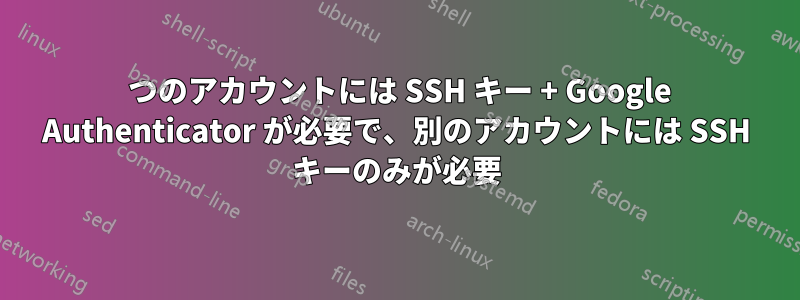
SSH 認証構造を設定しようとしていますが、/etc/ssh/sshd_config と /etc/pam.d/sshd の問題で苦労しています。
要件:
- root/sudo権限を持つアカウント
- 公開鍵認証が必要で、その後すぐに
- Google 認証システム
- 権限のないアカウント
- 公開鍵認証のみを必要とする
つまり、パスワードベースの認証は許可されず、公開鍵認証が常に必要となり、Google Authenticatorは条件付きで必要となる。
何が機能しているか:
特権アカウントは、公開キーの後に Google Authenticator が続くという、まさに必要なとおりに機能します。また、~/.ssh/authorized_keys に存在しない公開キーが拒否されること、およびキーを指定せずにログインしようとすると拒否されることも確認しました。
機能していないもの:
権限のないアカウントでは、秘密鍵のロックを解除するためのパスワードが正しく要求されるようで、鍵は成功すると思います。しかし、次のメッセージが表示されて認証は失敗します:
Permission denied (keyboard-interactive).
$ ssh -v -i id_rsa_unprivileged unprivileged@blahblah
debug1: Server accepts key: pkalg ssh-rsa blen 2071
Enter passphrase for key 'id_rsa_unprvileged':
Authenticated with partial success.
debug1: Authentications that can continue: keyboard-interactive
debug1: Next authentication method: keyboard-interactive
debug1: Authentications that can continue: keyboard-interactive
debug1: No more authentication methods to try.
unprivileged@blahblah: Permission denied (keyboard-interactive).
$ sudo cat /var/log/auth.log
Sep 3 00:44:13 hostname sshd[4249]: pam_succeed_if(sshd:auth): requirement "user ingroup 2faexempt" was met by user "unprivileged"
Sep 3 00:44:13 hostname sshd[4247]: error: PAM: Permission denied for unprivileged from IP ADDRESS
Sep 3 00:44:13 hostname sshd[4247]: Connection closed by IP ADDRESS port PORT [preauth]
注: 権限のないアカウントは、~/.ssh/authorized_keys に存在しない公開キーを正しく拒否し、キーを提供しないログイン試行を拒否します。
私がしたこと:
私の戦略「2faexempt」というグループを作成し、2 要素認証から除外するアカウント (権限のないアカウント) を追加します。次に、必要なポリシーを反映するように /etc/ssh/sshd と /etc/pam.d/sshd を編集しました。
$ cat /etc/ssh/sshd_config
# $OpenBSD: sshd_config,v 1.100 2016/08/15 12:32:04 naddy Exp $
# This is the sshd server system-wide configuration file. See
# sshd_config(5) for more information.
# This sshd was compiled with PATH=/usr/bin:/bin:/usr/sbin:/sbin
# The strategy used for options in the default sshd_config shipped with
# OpenSSH is to specify options with their default value where
# possible, but leave them commented. Uncommented options override the
# default value.
Port 22
AddressFamily inet
#ListenAddress 0.0.0.0
#ListenAddress ::
#HostKey /etc/ssh/ssh_host_rsa_key
#HostKey /etc/ssh/ssh_host_ecdsa_key
#HostKey /etc/ssh/ssh_host_ed25519_key
# Ciphers and keying
#RekeyLimit default none
# Logging
#SyslogFacility AUTH
#LogLevel INFO
# Authentication:
#LoginGraceTime 2m
PermitRootLogin no
#StrictModes yes
#MaxAuthTries 6
#MaxSessions 10
PubkeyAuthentication yes
# Expect .ssh/authorized_keys2 to be disregarded by default in future.
AuthorizedKeysFile .ssh/authorized_keys
#AuthorizedPrincipalsFile none
#AuthorizedKeysCommand none
#AuthorizedKeysCommandUser nobody
# For this to work you will also need host keys in /etc/ssh/ssh_known_hosts
#HostbasedAuthentication no
# Change to yes if you don't trust ~/.ssh/known_hosts for
# HostbasedAuthentication
#IgnoreUserKnownHosts no
# Don't read the user's ~/.rhosts and ~/.shosts files
#IgnoreRhosts yes
# To disable tunneled clear text passwords, change to no here!
PasswordAuthentication no
#PermitEmptyPasswords no
# Change to yes to enable challenge-response passwords (beware issues with
# some PAM modules and threads)
ChallengeResponseAuthentication yes
# Kerberos options
#KerberosAuthentication no
#KerberosOrLocalPasswd yes
#KerberosTicketCleanup yes
#KerberosGetAFSToken no
# GSSAPI options
#GSSAPIAuthentication no
#GSSAPICleanupCredentials yes
#GSSAPIStrictAcceptorCheck yes
#GSSAPIKeyExchange no
# Set this to 'yes' to enable PAM authentication, account processing,
# and session processing. If this is enabled, PAM authentication will
# be allowed through the ChallengeResponseAuthentication and
# PasswordAuthentication. Depending on your PAM configuration,
# PAM authentication via ChallengeResponseAuthentication may bypass
# the setting of "PermitRootLogin without-password".
# If you just want the PAM account and session checks to run without
# PAM authentication, then enable this but set PasswordAuthentication
# and ChallengeResponseAuthentication to 'no'.
UsePAM yes
# USER ADDED
#
AuthenticationMethods publickey,keyboard-interactive
#AllowAgentForwarding yes
#AllowTcpForwarding yes
#GatewayPorts no
X11Forwarding no
#X11DisplayOffset 10
#X11UseLocalhost yes
#PermitTTY yes
PrintMotd no
#PrintLastLog yes
#TCPKeepAlive yes
#UseLogin no
#UsePrivilegeSeparation sandbox
#PermitUserEnvironment no
#Compression delayed
#ClientAliveInterval 0
#ClientAliveCountMax 3
#UseDNS no
#PidFile /var/run/sshd.pid
#MaxStartups 10:30:100
#PermitTunnel no
#ChrootDirectory none
#VersionAddendum none
# no default banner path
#Banner none
# Allow client to pass locale environment variables
AcceptEnv LANG LC_*
# override default of no subsystems
Subsystem sftp /usr/lib/openssh/sftp-server
# Example of overriding settings on a per-user basis
#Match User anoncvs
# X11Forwarding no
# AllowTcpForwarding no
# PermitTTY no
# ForceCommand cvs server
$ cat /etc/pam.d/sshd
# PAM configuration for the Secure Shell service
# USER COMMENTED
#
## Standard Un*x authentication.
#@include common-auth
# Disallow non-root logins when /etc/nologin exists.
account required pam_nologin.so
# Uncomment and edit /etc/security/access.conf if you need to set complex
# access limits that are hard to express in sshd_config.
# account required pam_access.so
# Standard Un*x authorization.
@include common-account
# SELinux needs to be the first session rule. This ensures that any
# lingering context has been cleared. Without this it is possible that a
# module could execute code in the wrong domain.
session [success=ok ignore=ignore module_unknown=ignore default=bad] pam_selinux.so close
# Set the loginuid process attribute.
session required pam_loginuid.so
# Create a new session keyring.
session optional pam_keyinit.so force revoke
# Standard Un*x session setup and teardown.
@include common-session
# Print the message of the day upon successful login.
# This includes a dynamically generated part from /run/motd.dynamic
# and a static (admin-editable) part from /etc/motd.
session optional pam_motd.so motd=/run/motd.dynamic
session optional pam_motd.so noupdate
# Print the status of the user's mailbox upon successful login.
session optional pam_mail.so standard noenv # [1]
# Set up user limits from /etc/security/limits.conf.
session required pam_limits.so
# Read environment variables from /etc/environment and
# /etc/security/pam_env.conf.
session required pam_env.so # [1]
# In Debian 4.0 (etch), locale-related environment variables were moved to
# /etc/default/locale, so read that as well.
session required pam_env.so user_readenv=1 envfile=/etc/default/locale
# SELinux needs to intervene at login time to ensure that the process starts
# in the proper default security context. Only sessions which are intended
# to run in the user's context should be run after this.
session [success=ok ignore=ignore module_unknown=ignore default=bad] pam_selinux.so open
# Standard Un*x password updating.
@include common-password
# USER ADDED
#
auth [success=1 default=ignore] pam_succeed_if.so user ingroup 2faexempt
auth sufficient pam_google_authenticator.so
答え1
それを機能させる方法を思いつきました。非常にハッキーなようですが、機能します。
安全とは思えません。
$ cat relevant section of /etc/pam.d/sshd
...
# USER COMMENTED
#
## Standard Un*x authentication.
#@include common-auth
...
# USER ADDED
#
auth [success=1 default=ignore] pam_succeed_if.so user ingroup 2faexempt
auth requisite pam_google_authenticator.so
auth required pam_permit.so


